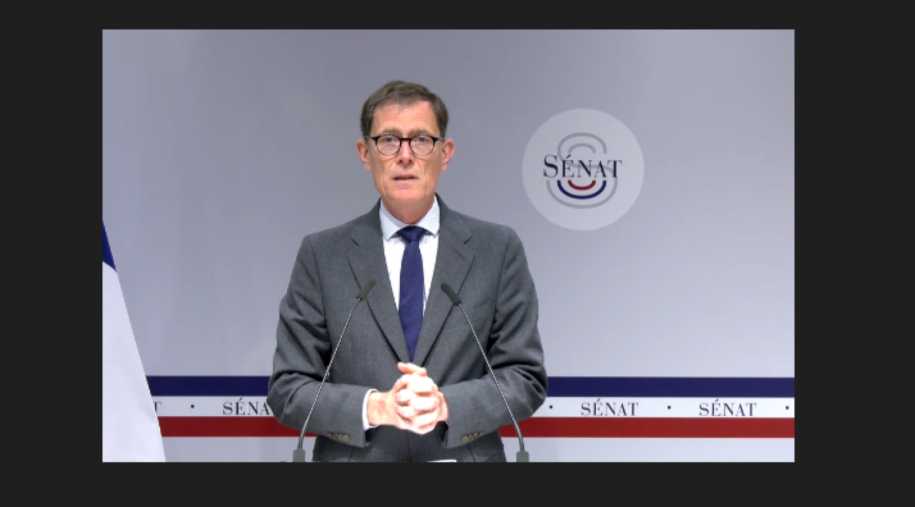Proposition de loi sur l'audiovisuel.
Laurent Lafon presents a proposition de loi relative à la réforme de l'audiovisuel public et à la souveraineté audiovisuelle.
Because for him, the "global reform of public broadcasting is no longer in any doubt", at a time when the audiovisual sector has been battling for the past ten years against SVOD platforms offering a plethora of services. Or where social networks have developed and diversified the sources of information where false information is sometimes instilled.
In this battle, says the senator, "the public authorities have so far remained on the sidelines, struggling to reform a legislative framework laid down in 1986" with a law that was certainly seminal, but at a time when the Internet... didn't exist.
As a result, there is now a real "asymmetry" between linear and delinearized players, with the consequence of "distorting competition", stresses Laurent Lafon. He now considers that an "ambitious, global strategy has become indispensable" to preserve audiovisual sovereignty.
From this observation, he draws two ambitions in the proposed new text, in two chapters. Consolidate the public broadcasting sector to create a "quality" free-to-air offering accessible to all on all media. To "significantly" revise the law of September 30, 1986 on freedom of communication, in order to put an end to the differences in treatment that are so visible "and which penalize French players, both public and private, in the face of their American competitors".
Creation of Médias France with a 5-year President
The text's key measure, then, is Article 1, which proposes the creation of a holding company, called France Médias, comprising four subsidiaries - France Télévisions, Radio France, France Médias Monde and the Institut national de l'audiovisuel (INA) - which would change its status from that of a public establishment to that of a company. Owned 100% by the French State, this holding company would be set up on January 1, 2024, provided that the Senate text is also adopted by the National Assembly.
This removes the spectre of an immediate, outright merger, a situation which "could give rise to the greatest reluctance, since it would call into question habits and working methods", as Senator Lafon points out. A "first step" that respects "the identities and autonomy of action of the companies" and "should enable us to better meet the challenges of the digital age".
In detailing the articles to come, article 2 reiterates that the French State "directly" holds the entire capital of France Médias. Article 3 stipulates that the Chairman and CEO of France Médias is to be appointed for 5 years by decree of the President of the Republic, on the recommendation of the Board of Directors, with the assent of Arcom, and after consultation with the relevant standing committees of the National Assembly and Senate, while the Managing Directors of the subsidiaries are also to be appointed for 5 years by the Board of Directors of each company, on the recommendation of its Chairman. However, the mandates of the Chairman and CEO and the Managing Directors may "be withdrawn".
Similarly, under article 5, the famous Contract of Objectives and Means (COM) would be replaced by a Multi-Year Strategic Agreement (CSP?), which would be adopted by the Board of Directors of France Médias "and the Supervisory Board of Arte France". Paragraph V of Article 2 would also establish the principle of a public resource of a "fiscal nature, perennial, sufficient, predictable and taking inflation into account", ruling out the possibility of a subsidy to finance public broadcasting.
Extend to platforms the obligations imposed on pay-TV channels
With regard to chapter 2 of the proposed law on "asymmetry" between linear and delinearized players, Senator Lafon highlights 5 articles. With article 10, he intends to extend to platforms the obligation imposed on subscription pay-TV channels to cede to free-to-air television services broadcast on DTT "certain rights relating to sporting events".
These changes are designed to "enable sports programs to continue to be broadcast on free-to-air terrestrial channels at a time when rising rights prices are accelerating their distribution, often exclusively on pay-TV platforms". Similarly, in Article 9, the text seeks to "ensure that broadcasters from outside the European Union cannot appropriate more than two-thirds of the broadcasting rights when a professional league issues a call for tenders to award the rights to broadcast a competition".
Article 11 also calls on ARCOM to determine the order in which services and programs of general interest are displayed, taking into account three criteria: "logical numbering, audiences for terrestrial services and the need to promote access to quality cultural and educational programs".
Article 12, for its part, advocates "reducing from five to two years the period during which the holder of a broadcasting license may not transfer control of the company that publishes the programs" in order not to "unnecessarily delay the implementation of industrial projects enabling companies in the sector to adapt to the new conditions of competition imposed by platforms".
Lastly, article 13 aims to "exclude the system of marketing mandates, to encourage channels to invest more in quality productions that are likely to be exported more and to contribute to the influence of French creation". And that, according to article 14, interactive services provided by DTT channels "must be compulsorily taken over by distributors". According to the bill's signatories, this provision is intended to enable the deployment of the Hbbtv (Hybrid broadcast broadband TV) standard, which "enhances the attractiveness of DTT".
Article 15, for its part, aims to make it compulsory for radio sets to receive digital terrestrial radio using the DAB+ standard, and to stipulate that all new vehicles must also be able to receive digital terrestrial radio using the same standard. The text, supported by the Senate majority, should be on the Senate agenda for first reading as early as the week of June 12, according to Lafon.

